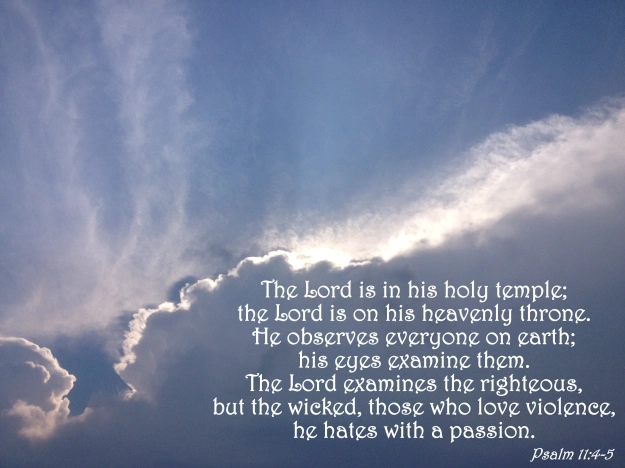THE SEED
“The Lord is in his holy temple; the Lord is on his heavenly throne. He observes everyone on earth; his eyes examine them.”
In Psalm 11:4, we are reminded that the Lord, from His throne in heaven, sees everything, He is keeping watch on the wicked and the good. God’s watchful gaze is a comforting thought. It means that in times of joy or sorrow, in moments of triumph and struggle, His eyes are on us. He sees our actions, knows our hearts, and is aware of every circumstance we face. This awareness brings both responsibility and solace. We are responsible for our actions, for God observes them. However, we also find solace in the knowledge that God sees our pain, our joys, and our efforts. He sees every tear and every smile, and He is with us through it all. As we go about our daily lives, let us remember that the Lord’s eyes are upon us. And as a child of God, this awareness should guide us to live in a manner pleasing to Him. And when we face challenges or uncertainties, we should also find comfort in the knowledge that we are never alone, for the Lord, our loving and watchful Father, is with us.
BIBLE READINGS: Psalms 11:4-7
PRAYER: Lord, let the awareness of your gaze on me guide me to live a righteous and victorious life, in Jesus’ name. Amen
OLÚWA NWO ÀWỌN OLÓDODO ÀTI ÀWỌN ALÁÌṢÒDODO
IRUGBIN NAA
Olúwa nbẹ nínú tẹmpili mímọ̀ Rẹ̀, ìtẹ́ OLÚWA mbẹ li ọrùn: ojú rẹ̀ nwo ipenpeju rẹ ndan, àwọn ọmọ ènìyàn wo. Orin Dafidi 11:4.
Nínú Sáàmù 11 ẹsẹ 4 a rán wa létí pé Olúwa láti orí ìtẹ́ rẹ̀ ní ọ̀run rí ohun gbogbo. Tí ó sì nṣọ́ àwọn ènìyàn búburú àti àwọn èniyàn réré. Ojú Ọlọ́run ti ńwo àwọn onibajẹ́ jẹ́ èrò ìtùnú. Tí ó túmọ̀ sí pé ní àwọn àkókò ayọ̀ tàbí ìbànújẹ́ ní àwọn igba ìṣẹ́gun àti ìjàkadì wa, oju rẹ wa lara wa. O ri awọn iṣe wa, O mọ ọkan wa, ati pe o mọ gbogbo àwọn ìdojúkọ wa. Imọ lara yi n mu ojúṣe ati ifọkanbalẹ wa fún wa. A nilo láti duro fún iwa ati iṣe wa, nitoripe Ọlọrun n ṣakiyesi wọn. Sibẹsibẹ a tun ri itunu ninu imọ pe Ọlọrun ri irora wa, tabi ayọ̀ ati igbiyanju wa. O ri gbogbo ẹkún, gbogbo ẹrin ati pe o wa pẹlu wa ninu gbogbo rẹ. Bi a ti nlọ nipa igbesi aye wa ojoojumọ, o jẹ ki a ranti pe oju Oluwa wa lara wa. Ati bi ọmọ Ọlọ́run imoye yi yẹ ki o dari wa lati gbe ọ̀nà tí ó dùn mọ́ ọn. Nígbà tí a bá dojúkọ àwọn ìpèníjà tàbí àwọn àìdánilójú a ní láti rí ìtùnú nínú ìmọ̀ náà pé a kò dá wà nikan, nítorí Olúwa jẹ́ onífẹ̀ẹ́ àti baba tí ó jẹ́ oluṣọ ́ wà pẹ̀lú.
BIBELI KIKA: Orin Dafidi 11: 4 -7
ADURA: Oluwa fun mí ni ọkàn tí o ngba ẹ̀kọ́, ran mi lọwọ lati gba itọsọna oniwa-bi-Ọlọrun ni orukọ Jesu Amin
